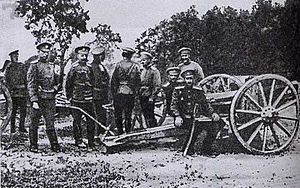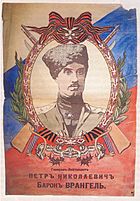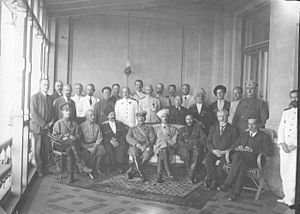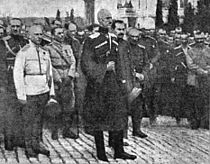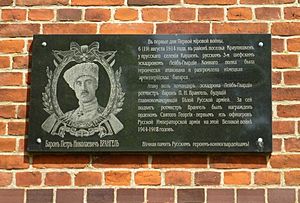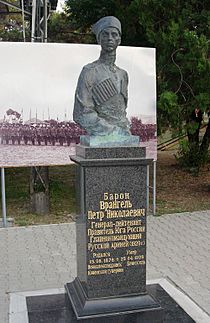Pyotr Wrangel facts for kids
Quick facts for kids
Pyotr Nikolayevich Wrangel
|
|
|---|---|
| Пётр Никола́евич Вра́нгель Peter Nikolaus von Wrangel |
|
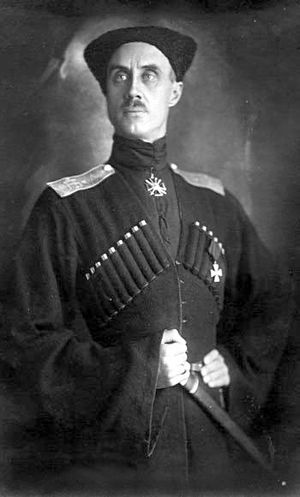
Pyotr Wrangel, The Black Baron
|
|
| Commander-in-Chief of the Armed Forces of South Russia | |
| In office 4 April 1920 – 21 November 1920 |
|
| Preceded by | Anton Denikin |
| Succeeded by | office disestablished |
| Personal details | |
| Born | August 27 [O.S. August 15] 1878 Novalexandrovsk, Russian Empire |
| Died | 25 April 1928 (aged 49) Brussels, Belgium |
| Awards | See below |
| Signature | |
| Military service | |
| Allegiance | |
| Branch/service | Imperial Russian Army White Army |
| Years of service | 1902–1920 |
| Rank | Lieutenant General |
| Commands | Caucasus Army of South Russia |
| Battles/wars | Russo-Japanese War World War I Russian Civil War |
Baron Pyotr Nikolayevich Wrangel (Russian: Пётр Никола́евич барон Вра́нгель, romanized: Pëtr Nikoláevič Vrángel', German: Freiherr Peter Nikolaus von Wrangel; August 27, 1878 – April 25, 1928) was a Russian officer. He was also known by his nickname, the Black Baron. He came from a Baltic German family and served in the Imperial Russian Army. During the later part of the Russian Civil War, he led the White Army in Southern Russia. This army was fighting against the Bolsheviks. After his side lost the war in 1920, he left Russia. He became one of the most well-known White émigrés (Russians who left the country).
Contents
Family Background
Wrangel was born in Novalexandrovsk, which was part of the Russian Empire (now Zarasai, Lithuania). His father was Baron Nikolai Wrangel, and his mother was Maria Dimitrievna Demetieva-Maikova. His family, the Wrangel family, was a very old and noble family of German origin. They had lived in the region of Livland for a long time. Pyotr Nikolayevich Wrangel was related to, but not closely, the famous Arctic explorer Ferdinand von Wrangel.
Early Life and Education
Pyotr Wrangel finished high school in Rostov in 1896. He then studied at the Institute of Mining in St. Petersburg, graduating in 1901. After that, he joined the army as a volunteer in the special Life Guards cavalry. In 1902, he became a reserve officer. He soon left the army for a short time and traveled to Irkutsk. There, he worked on special assignments for the local Governor-General.
Military Career and World War I
When the Russo-Japanese War started in February 1904, Wrangel rejoined the army. He was sent to the 2nd Regiment of the Transbaikal Cossack Corps. By December 1904, he was promoted to lieutenant.
After the war, in 1906, he helped calm down rebels in Siberia. In 1907, he returned to the Life Guards Cavalry Regiment. He married Olga Mikhaylovna Ivanenko in 1908, and they had four children. Wrangel continued his military education, graduating from the Nicholas Imperial General Staff Academy in 1910.
When World War I began, Wrangel was promoted to captain and led a cavalry squadron. He was one of the first Russian officers to receive the Order of St. George (4th degree) in the war. This was the highest military award in the Russian Empire. By December 1914, he became a colonel. In 1915, he was moved to the Southwestern Front. He took command of the 1st Regiment of the Transbaikal Cossacks.
His unit fought bravely in Galicia against the Austrians. Wrangel was especially noted for his actions during the Brusilov Offensive. In January 1917, he was promoted to major general. He then commanded the 2nd Brigade of the Ussuri Cavalry Division. He received another award, the George Cross (4th degree), for defending the Zbruch River in the summer of 1917.
Role in the Russian Civil War
After Russia left World War I, Wrangel resigned from the army. He went to live at his home in Yalta, in Crimea. The Bolsheviks arrested him in late 1917, but he was released. He escaped to Kiev and joined the Ukrainian State government led by Pavlo Skoropadskyi. However, he soon realized that this government was only strong because of German support, which was fading. So, in August 1918, he joined the Volunteer Army in Yekaterinodar. This army was fighting against the Bolsheviks. He was given command of the 1st Cavalry Division and became a major general in the White movement.
After a successful campaign in late 1918, he was promoted to lieutenant general. His division grew to the size of a corps. In December 1918, Wrangel became Anton Denikin's Chief of Staff in the Armed Forces of South Russia. In January 1919, he took command of the Caucasian Volunteer Army within these forces.
Wrangel was known as a skilled leader. Unlike some other White Army generals, he made sure his troops did not break laws or steal. He had disagreements with Denikin about military plans. Wrangel believed it was most important to connect with Alexander Kolchak's forces along the Volga river. However, Denikin wanted to move towards Tsaritsyn. Wrangel eventually led his forces north towards Moscow in a failed attempt to capture it in autumn 1919. Because of his ongoing disagreements with Denikin, he was removed from command. He then went into exile in Constantinople on February 8, 1920.
However, Denikin was forced to resign on March 20, 1920. A military group in Sevastopol asked Wrangel to return as the leader of the White forces in Crimea. He took this role on April 4, 1920, leading the Russian Army. He tried to create a new government that would make big changes, including land reforms. He also recognized and worked with new anti-Bolshevik republics, like the Ukrainian People's Republic.
By this point in the Russian Civil War, these efforts were too late. The White movement was quickly losing support both inside Russia and from other countries. Wrangel is remembered by the nickname "Black Baron" in the famous marching song The Red Army is the Strongest. This song was very popular in the early Soviet Union.
From June to October 1920, General Wrangel used a building in Melitopol as his main office. This building later became the Melitopol Museum of Local History.
Facing overwhelming numbers and defeat in Northern Tavria and Crimea, Wrangel organized a large evacuation from the shores of the Black Sea. He gave every officer, soldier, and civilian a choice: to leave with him or to stay in Russia. Those who chose to stay in Crimea faced harsh treatment by the Bolsheviks. Wrangel evacuated the White forces from Crimea in 1920. The remaining ships of the Russian Imperial Navy became known as Wrangel's fleet. The last military and civilian people left Russia with Wrangel on November 14, 1920.
Initially, Wrangel lived on his yacht, Lucullus, in Constantinople. His yacht was hit and sunk by an Italian ship. Wrangel was on shore at the time, so he survived. Many believed this was an attempt to kill him.
Life in Exile
In 1922, Wrangel moved to the Kingdom of Serbs, Croats and Slovenes. He became the leader of all White Russian refugees. Many considered him the most important of all the White émigrés.
In 1924, in the Serbian town of Sremski Karlovci, he created the Russian All-Military Union. This was a group for all Russian military people who had left the country. He wanted to keep a Russian military organization ready for another fight against Bolshevism.
In September 1927, Wrangel and his family moved to Brussels, Belgium. There, he worked as a mining engineer. He published his memoirs in a magazine called White Cause in Berlin in 1928.
Death and Burial
Wrangel died suddenly on April 25, 1928. It's possible he caught typhus. However, his family thought he might have been poisoned by his butler's brother, who had briefly lived with them in Brussels and was believed to be a Soviet agent.
He was first buried in Brussels. More than a year later, his body was moved to Belgrade. On October 6, 1929, in a public ceremony, his remains were reburied in the Church of the Holy Trinity, Belgrade, which is a Russian church. This was done according to his wishes.
Personal Life
He was married to Olga Mikhailovna Ivanienko (1883–1968). They had two sons and two daughters:
- Baroness Helena Petrovna Wrangel (1909–1999)
- Baron Peter Petrovich Wrangel (1911–1999)
- Baroness Nathalie Petrovna Wrangel (1913–2013)
- Baron Alexis Petrovich Wrangel (1922–2005)
Legacy and Recognition
The town of Sremski Karlovci, where Wrangel had his headquarters after leaving Russia, built a monument in his honor in 2007.
During the Russian Civil War, the Red Army's combat song, White Army, Black Baron, was named after Wrangel. The song's first part calls him the leader of the White forces and a serious threat to Soviet Russia.
Many Russian officers respected Wrangel greatly. After Hitler's invasion of the Soviet Union in June 1941, some military leaders who had left Russia wondered what Wrangel would have done. For example, Major General Mikhail Mikhailovich Zinkevich said in 1941 that if Wrangel were alive, he would have supported the Germans.
In 2015, the Russian Federation government started bringing back the remains of White Emigres buried abroad. However, Wrangel's family refused to have his remains returned to Russia. They felt that the current Russian government had not "condemned the evil [of Bolshevism]." This referred to Vladimir Putin's choice not to speak out against Soviet crimes.
Wrangel was played by Russian actor Aleksandr Galibin in the first season of the Serbian TV series Balkan Shadows. The series features Wrangel's Cossack emigres as important characters.
In September 2021, after U.S. troops left Afghanistan, Wrangel's grandson, Peter A. Basilevsky, wrote an opinion piece in The Wall Street Journal. He compared the U.S. government's problems in Afghanistan to Wrangel's successful evacuation of 150,000 anti-Bolshevik soldiers and civilians in November 1920. Wrangel achieved this with fewer resources and while the Red Army was advancing.
Honours
 Order of St. Anne 4th class, July 4, 1904
Order of St. Anne 4th class, July 4, 1904 Order of St. Anne 3rd class, May 9, 1906
Order of St. Anne 3rd class, May 9, 1906Order of St. Stanislaus 3rd class, with swords and bow, January 6, 1906
Order of St. Stanislaus 2nd class, December 6, 1912
 Order of St. George, 4th class, October 13, 1914
Order of St. George, 4th class, October 13, 1914 Order of St Vladimir, 4th class with swords and bow, October 24, 1914
Order of St Vladimir, 4th class with swords and bow, October 24, 1914 Golden Sword of St George "for courage", June 10, 1915
Golden Sword of St George "for courage", June 10, 1915 Order of St. Vladimir, 3rd class with swords, December 8, 1915
Order of St. Vladimir, 3rd class with swords, December 8, 1915 Cross of St. George, 4th class, July 24, 1917
Cross of St. George, 4th class, July 24, 1917- Order of Saint Nicholas Thaumaturgus, 2nd degree
- Papal Order of the Holy Sepulchre of Jerusalem, 1920
See also
 In Spanish: Piotr Wrangel para niños
In Spanish: Piotr Wrangel para niños
- List of unsolved deaths
- Russian Civil War
- White Army, Black Baron
- White movement
- Wrangel's fleet
Books
- Newspaper clippings about Pyotr Wrangel in the 20th Century Press Archives of the ZBW
- Vinogradoff, Paul (1922). "Wrangel, Peter Nicholaievich, Baron". Encyclopædia Britannica (12th).
 | Emma Amos |
 | Edward Mitchell Bannister |
 | Larry D. Alexander |
 | Ernie Barnes |


